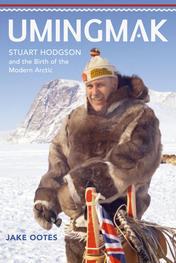Biography & Autobiography



Arctic Bay’s community hall, a similar structure to that in Grise Fiord, was jammed with people. Among the interplay of adults talking in the measured Eskimo language, the hall was bombarded by the hubbub of babies crying, toddlers thundering up and down the plywood floor, mothers soothing their young and the door opening and slamming shut as another late arrival entered. Each time the door opened a blast of cold air and fog billowed into the room. I kept my parka done up tight and my mitts on. My nostrils swam in the distinctive smells of sealskin and fur, a strong and oily combination that was definitely peculiar but not unpleasant.
At the entrance, a mother with a particularly unhappy baby in the back of her parka calmed the child by crooning softly and doing a distinctive type of jig. She placed one foot well ahead of the other and began a step in which her feet shuffled back and forth and her body weight was transferred slowly to and fro.
Tacked on the wall were numerous bulletins. One handmade poster announced: Ice Thickness: 24 Ft. 9 Ins.
Another, from the Atmospheric Environment Service at Resolute, read:
The sun never rises from Nov 7 to Feb 4, inclusive.
The sun never sets from April 30 to August 13, inclusive.
Maximum Temperature Today: -25°F.
Minimum Temperature Today: -52°F.
Wind: 15 mph.
Wind Chill Factor: -90°F. Bill Kempt, the local schoolteacher who, like Cloughley in Grise Fiord, doubled as area administrator, seated themselves at a plywood table at the front. As we waited for the stragglers to get settled, I studied the landscape through the little window by my shoulder. The hall looked out over a bay named for a whaling ship called Arctic that anchored there in 1872. Ninety people lived in Arctic Bay, and another two hundred hunted for a living in nomadic camps scattered around the region. Hunting seal, polar bear and white fox was the main occupation and means of sustenance. The settlement had a little store operated by the Hudson’s Bay Company, a one-room school, an Anglican mission and a series of small houses. All of the white residents of Arctic Bay were in the audience: the Hudson’s Bay clerk, the Hudson’s Bay manager, the power plant operator and Bill Kempt.
I asked the Hudson’s Bay Company clerk, seated next to me, if there was a community leader. He explained that most Eskimo communities had no clearly labelled leaders. If anyone received special designation, it was because of his or her proven skills as a hunter or a healer or a prophet. No one exercised political dominion over others. Indian communities had been the same until the white man’s treaty parties went to each band and demanded someone be named leader, just so he could mark his X on an unintelligible piece of paper. But of course no treaty parties ever visited the Eskimos because no one had coveted their land.
An Eskimo in rough pants and a long, checked jacket moved into the empty space in front of the seats, carrying a large hoop with a handle fastened on the side. It was a drum, flat and somewhat larger than a barrel hoop, with a skin stretched over the outer rim. The man twirled the hoop back and forth, giving the side a whack with the thick, short stick held in his other hand. Then he twirled the hoop in the other direction and gave it another whack. Boom. Boom. The sound reverberated through the small building. He repeated the twirling and beating motions faster and faster until the room filled with a firm, steady rhythm. He squatted down and began a hopping shuffle, keeping time with his drum. Boom. Boom. Then he began to chant. “Ayee. Ayee.” Several women rose and spilled into the open space, joining the drummer in his song. The drummer’s torso was almost doubled over and his legs bent as he moved to the powerful rhythm. With his eyes closed, he gave the appearance of being totally absorbed and transported by his art. The women swayed back and forth, echoing the drummer’s guttural chant.
He was singing and telling the history of the community, the power of the land, the strength of the spirits, said the Bay man.
When finished, another drummer performed a new song and dance, followed by several more. Both men and women took turns, each performing a unique song. The hall was animated, excited. Everyone watched and smiled appreciatively. When the drummers finished, two women stepped forward and, with their faces four or five inches apart, started breathing hard, in and out, each into the other’s mouth. A haunting sound erupted and built to a crescendo. It was a stirring performance.
“Throat singing. Passed on from generation to generation,” explained the Bay clerk. “Very difficult to do.”
Bill Kempt thanked the performers, announced that he was putting on his area administrator’s hat, and introduced Hodgson. As in Grise Fiord, Hodgson called for someone to act as translator. Some minutes passed before a young man stood up, came forward, and took a seat beside the Commissioner.
With the young man’s help, Hodgson talked about how the group was stronger than the individual and how several could overcome a polar bear when one hunter alone might be killed. There was a lot of whispering and knowing smiles when he talked about the way muskoxen work together to protect the weak when danger approaches. Some of the people looked covertly at Hodgson and spoke a few words to each other in Eskimo. He paused and looked puzzled.
The translator said, “Muskox! Umingmak! Looks like you!”
Hodgson grinned, then seized on the fact he had the audience’s attention. He turned to the blackboard and with a stubby piece of chalk graphed out a pyramid to show the relationship between the big government in Ottawa, the government in Yellowknife, and the myriad of communities like Arctic Bay. Soon he had squiggles, lines, arrows and circles to show that some power was now handed down from Ottawa to Yellowknife, and that members of the Council of the Northwest Territories, like Michael, represented and spoke on behalf of Arctic Bay and other Baffin Island communities.
Hodgson was well aware these people knew absolutely nothing about the functioning of government, about European democratic traditions, about protocol or politics. He wanted to give them an elementary primer, using explanations like his snowmobile analogy that were simple but not condescending. Speaking in English, he made an effort to adopt the unhurried cadence of the Eskimo language—a slow, measured delivery with lots of pauses that helped build rapport with his audience.
It was a lot like watching a one-man play, in which the actor entrances, mystifies and then enlightens his audience. I admired Hodgson’s skill, his natural ability to engage an audience, even this one, which was more uncomprehending than he’d ever met in his union days. The pitch of his voice, his posture, eye contact, facial expressions, hand gestures and the way he walked in front of the crowd to involve everyone was masterful.
An hour after the meeting started the back door opened and, along with a rush of ice fog, in shuffled a plump, short woman with a wide, toothless smile and tattoos on her face. The crowd fell silent.
“Atuat,” whispered the Bay clerk. “Eighty-one years old! Hadn’t encountered white people before she was forty or more. They call her Grandmother. Hunted until she was well into her seventies, and once killed a polar bear using nothing but a spear. People treat her like The Queen.”
With the help of a cane, the grand old lady walked past the audience to the open space where the drum dancers had performed. I stared at the vivid blue tattoos on her face. There were parallel lines from her mouth down to the middle of her chin; more swept across her cheekbones and descended from her hairline to the bridge of her nose. She was maybe four feet ten inches tall and hunched over from age. Her skin was wrinkled but her hair was still dark and her eyes clear. Born in the late 1800s, she had fully experienced all the harshness of a nomadic Arctic existence.
Atuat plonked herself down on the floor in the open space before the seats and stared up at Hodgson, giving him a big gap-toothed smile. Hodgson walked from behind the table and extended his hand. She took it for a brief moment and said something in Eskimo before she let Hodgson return to his place.
Hodgson threw the meeting open to questions, and there were plenty. As with Grise Fiord, they were about ways to solve the privations and isolation of the residents, not about how Hodgson’s new government could have any bearing on the realities of their lives. Hodgson patiently answered them, throwing out instant solutions in some cases, offering to come back with answers to others, skilfully keeping the audience involved. When three men started discussing a point privately, he spoke to one of them and flashed a smile to encourage open discussion. If an old lady looked doubtful, he’d stop and give her time to ask a question. The meeting continued for another hour. Then, after about two minutes of silence, he asked, “Are there any more questions before we close this meeting?”
Atuat motioned and someone darted forward to help her to her feet. She leaned on her stick and looked at Hodgson as she spoke. She spoke slowly, thoughtfully, melodiously. Sometimes, when I thought she was finished, she was just considering her next words. Hodgson listened as if he planned to spend the next two weeks in Arctic Bay.
The translator spoke, “Ten years ago I lived in a snow house in winter and a tent in summer. It was the old way, but it was a difficult way to live. Now we have houses and we enjoy living in them much more. We are warm and dry all the time.”
There were nods and murmurs of agreement around the audience.
“You promise to do many good things for our community. For that we are grateful. We are grateful that you want to help.”
Hodgson nodded, waiting for her to speak again.
“I have one request. Could you build a community bathhouse for us in Arctic Bay? I had a bath once, and I’d be happy if I could have one more before I die.”
I was stunned, suddenly aware of how much we take for granted in our southern lives. Hodgson looked at her with a smile. “I will arrange to have the materials shipped up on the summer sealift and the people in the community will build the bathhouse this fall. And when it’s built, I want you to be the first one to use it! Next year, when I come back, I also want to use it.”
Smiles of appreciation filled the room. Atuat beamed and walked to the table where she extended her hand to Hodgson. Hodgson bent down and hugged her, to the delight of the others. They behaved like lifelong friends.
The meeting had come to a close and Bill Kempt announced it was time for lunch, a welcome respite. My eyes were raw from the tobacco smoke, which rolled through the room like sea fog.







